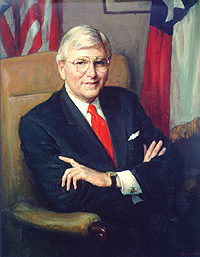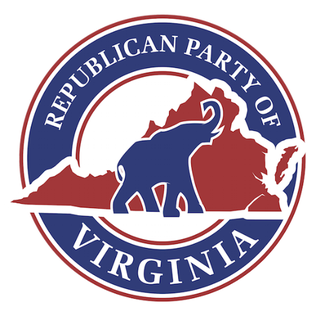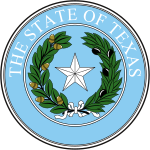
Mark Wells White Jr. was an American politician and lawyer who served as the 43rd governor of Texas from 1983 to 1987. He also held office as Secretary of State of Texas (1973–1977), and as Texas Attorney General (1979–1983).

Robert Douglas Bullock was an American attorney and Democratic politician from Texas, whose career spanned four decades. His service culminated in his term as the 38th Lieutenant Governor of Texas from January 15, 1991, to January 19, 1999, during the term of Governor Ann Richards and the first term of Governor George W. Bush. Bullock is among the last Democrats to win and/or hold statewide office in Texas.

United States gubernatorial elections were held on November 7, 2006, in 36 states and two territories. The elections coincided with the midterm elections of the United States Senate and the United States House of Representatives.

The Republican Party of Virginia (RPV) is the Virginia chapter of the Republican Party. It is based at the Richard D. Obenshain Center in Richmond. As of May 2024, it controls all three statewide elected offices and 5 out of 11 U.S. House seats.

The 2002 Texas gubernatorial election was held on November 5, 2002, to elect the governor of Texas. Incumbent Republican governor Rick Perry, who had ascended to the governorship after the resignation of George W. Bush to become President of the United States, was elected to his first full term in office, winning 58% of the vote to Democrat Tony Sanchez's 40%.

William Pettus Hobby Jr. is an American Democratic politician who served a record eighteen years as the 37th Lieutenant Governor of Texas. He held that office from January 16, 1973, to January 15, 1991, for an unprecedented five terms; he was the last lieutenant governor to serve a two-year term and the first elected to a four-year term when the Texas Constitution was amended to lengthen terms for statewide elected officeholders to four years beginning with the 1974 elections. The principal duty of the Texas lieutenant governor is to preside over the Texas State Senate.

The 2002 Hawaii gubernatorial election was held on November 5, 2002, to select the governor of Hawaii. Incumbent Democratic Governor of Hawaii Ben Cayetano was term-limited and therefore could not run for re-election. Former Maui Mayor Linda Lingle, who had narrowly lost the 1998 election, was nominated once again by the Republicans while Lieutenant Governor Mazie Hirono earned the Democratic nomination in a tight race. Lingle and Hirono duked it out in a hard-fought campaign, with Hirono's campaign crippled by allegations of corruption within the Hawaii Democratic Party and many voters desiring a change. The influence of migrants from the mainland as well as the decease in party loyalty of ethnic groups led more voters towards Lingle. Ultimately Lingle defeated Hirono in a close election, making her the first Republican governor of Hawaii elected since 1959 and the state's first-ever female governor. She was the first white person to be elected governor of the state since 1970. Lingle and Hirono faced off again in Hawaii's 2012 U.S. Senate election; Hirono won that race and thus became the first female U.S. senator in Hawaii history.

Elections in Alabama are authorized under the Alabama State Constitution, which establishes elections for the state level officers, cabinet, and legislature, and the election of county-level officers, including members of school boards.

The 1962 Texas gubernatorial election was held on November 6, 1962, to elect the governor of Texas. Incumbent Democratic governor Price Daniel was running for reelection to a fourth term, but was defeated in the primary by John Connally. Although Connally was easily elected, Republican Jack Cox's 46% of the vote was the highest received by any Republican candidate for governor since George C. Butte in 1924.

A general election was held in the U.S. state of Washington on November 8, 2016. The primary was held on August 2.

Two United States Senate elections were held in Illinois on March 26, 1913. The two elections were interconnected through a compromise made to elect a Democrat in the regular election and a Republican in the special election.

On July 22, 1916, Progressive William Stephens, a U.S. Representative in California's 10th congressional district, resigned to become Lieutenant Governor of California, an appointment he accepted after former Lieutenant Governor John M. Eshleman died in office. To fill the vacancy created by Stephens' resignation, a special election was held for the remainder of the term. It was scheduled for November 7, 1916, the same day as the general election for the full term beginning March 4, 1917.
Democrat William Proxmire won a special election to fill the vacancy created by the death of Senator Joseph R. McCarthy (R-WI). Also, Price Daniel (D-TX) left the Senate to become governor of Texas, and Democrat Ralph Yarborough won a special election for that Senate seat. The Democrats thus made a net gain of one seat. However, Congress was out of session at the time of the Democratic gain in Wisconsin, and the Republicans gained a Democratic-held seat only weeks after the next session started, when Republican John D. Hoblitzell Jr. was appointed to fill the vacancy created by the death of Senator Matthew M. Neely (D-WV).

Elections were held in Illinois on Tuesday, November 6, 1990. The primary elections were held on March 20, 1990.

Elections were held in Illinois on Tuesday, November 4, 1986.

Elections were held in Illinois on Tuesday, November 7, 1978.

The Texas lieutenant gubernatorial election was held on November 6, 1990, to elect the Lieutenant Governor of Texas. Incumbent Comptroller Bob Bullock was elected over Republican Robert Mosbacher Jr. Bullock's term as Comptroller was complicated, despite his public drinking problem and proneness to outbursts he was popular because of his record that included large settlements that benefited the state and its citizens. Mosbacher had previously run for public office in 1984 when he ran in the Republican Primary for Texas' Senate seat. Since 1986 he had been CEO of his families Energy company, Mosbacher Energy.

The 1982 Texas lieutenant gubernatorial election was held on November 2, 1982, to elect the Lieutenant Governor of Texas. The Incumbent, William P. Hobby Jr. ran for re-election to his fourth term, he was elected against Republican and former Secretary of State of Texas, George Strake Jr. During the campaign Strake ran a weekly series of newspaper ads called "Strake Talk" in which he would discuss current issues with the readers and hoped to generate public interest in the issues he discussed. Hobby ultimately won the election with 58% of the vote to Strake's 40%, and was sworn in on January 18, 1983.

The 1978 Texas lieutenant gubernatorial election was held on November 7, 1978, to elect the lieutenant governor of Texas. The incumbent, William P. Hobby Jr. ran for re-election to his third term, he was elected against Republican, Gaylord Marshall, whom he had beaten four years earlier. Hobby won the election with 65% of the vote to Marshall's 34%, and was sworn in on January 15, 1979, alongside Texas' first Republican governor since Reconstruction, Bill Clements who had won the concurrent gubernatorial election.

The 1974 Texas lieutenant gubernatorial election was held on November 5, 1974, to elect the Lieutenant Governor of Texas. The Incumbent, William P. Hobby Jr. ran for re-election to his second term, he was elected against Republican, Gaylord Marshall. Hobby won the election with 74% of the vote to Marshall's 24%. Hobby was sworn in for his second term on January 21, 1975.


















